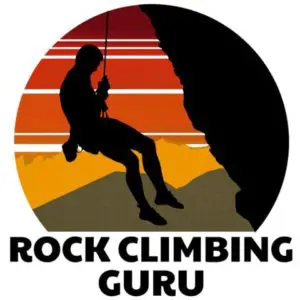If you are looking to take your climbing to the next level, aggressive climbing shoes may be in your future. That being said, aggressive climbing shoes are not for everyone. At what point you should get aggressive climbing shoes largely depends on the type of climbing you want to do and your current ability.
As a general rule, climbers should only buy aggressive shoes when they can consistently boulder at least V4 and have over 1 year of climbing experience. Aggressive climbing shoes will help climbers send highly technical bouldering problems that require precise footwork on tiny foot holds.
Aggressive shoes are not for every climber. They will provide some climbers with tremendous benefits and help them reach new heights. For other climbers, they will be a complete waste of time and money. The article below details exactly when aggressive shoes are helpful and when you should stay away from them.
See the current price of which aggressive shoes I recommend on Amazon here.
When Aggressive Climbing Shoes Make a Difference
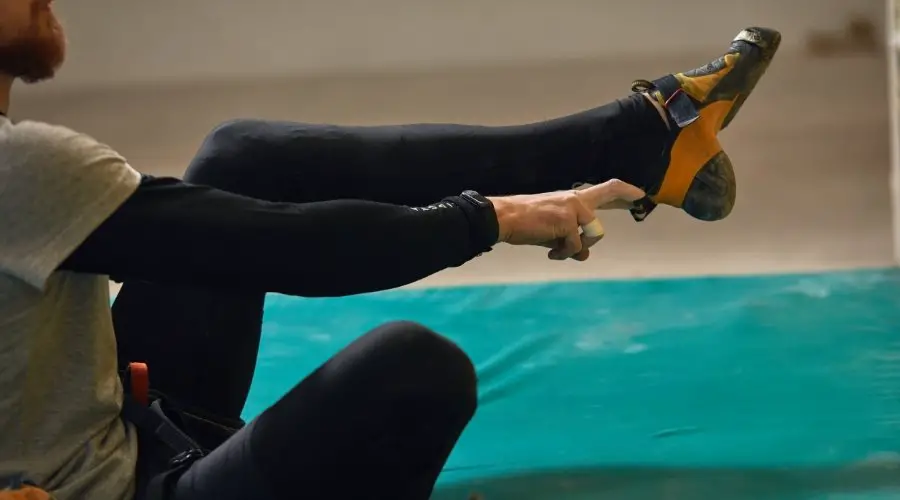
Aggressive shoes are absolutely fantastic for taking your bouldering to the next level. They are especially useful on overhanging problems.
Their downturned shape provides climbers with the ability to use small chips and pockets they wouldn’t be able to in neutral or moderately downturned shoes. On top of this, they are typically made with soft and thin rubber providing climbers with increased sensitivity and feel.
Aggressive climbing shoes make a difference when climbing highly technical problems. The benefits of aggressive shoes will be the most pronounced when climbing on overhanging problems that require precise foot placements.
It should be noted that the shape of aggressive shoes is quite uncomfortable and could lead to foot problems with some climbers if worn too tight.
I know that it is considered a badge of honor to fit your feet into incredibly small climbing shoes but this is definitely not the best for your feet. I highly recommend educating yourself on the potential problems and injuries of wearing excessively tight shoes.
Check out my article here that details the potential risks of excessively tight shoes and shares multiple ways to help reduce the chance of developing any foot problems from climbing.
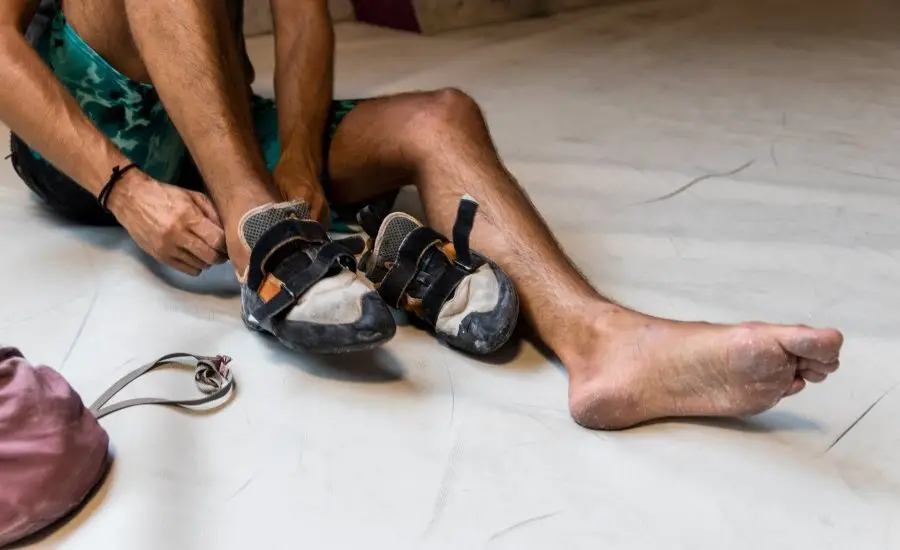
Minimum Climbing Grade and Experience for Aggressive Shoes
Climbers should be able to meet the following criteria before investing in a pair of aggressive climbing shoes.
Minimum Climbing Grade for Aggressive Shoes
All bouldering grades are subjective and will be slightly more or less difficult for every climber. That being said, they are generally pretty consistent. An average V6 will be much harder than the average V3.
As discussed above, a minimum climbing ability is required to start seeing the benefits of aggressive climbing shoes. Using neutral shoes or aggressive shoes when climbing a V0 will not make any difference.
On average, problems that involve the footwork and technique necessary for aggressive shoes to be useful are typically graded V4 and above.
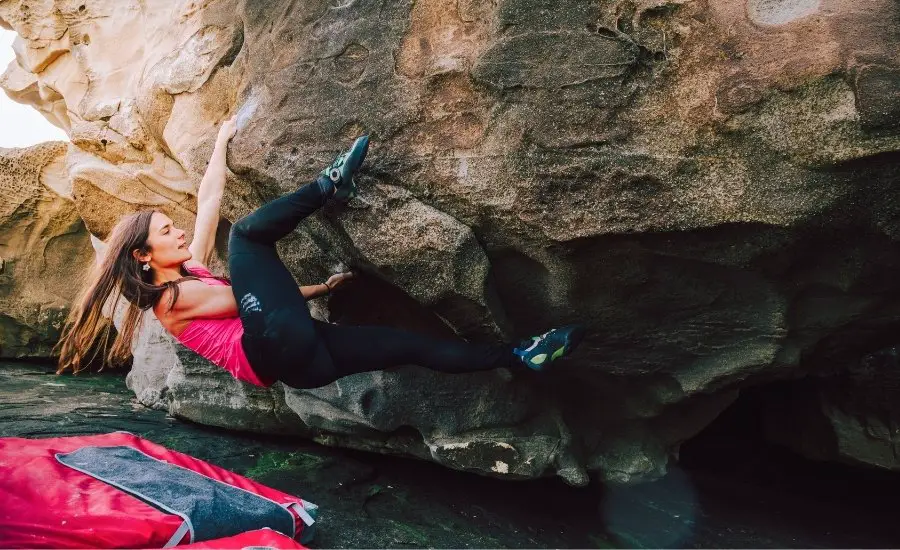
I want to hammer home that this is a general rule and is not always the case. Aggressive shoes may be more beneficial on a technical overhanging V3 than a straight vertical V6 that relies solely on raw power.
Just being able to climb hard doesn’t automatically mean you should get aggressive climbing shoes.
Minimum Climbing Experience for Aggressive Shoes
There are some climbers out there that are just naturally talented. They could be climbing V4 within just a few months of climbing. It’s crazy to think about but it’s true. Some people are just dang gifted.
For them, they will not be accustomed to the fit and feel of climbing shoes in general. It does not make sense to go out and buy aggressive shoes for your first ever pair of climbing shoes. This is where the experience minimum comes into play.
Climbing for a year will allow climbers to become accustomed to the fit and feel of climbing shoes. In addition, it will allow them to further develop their climbing technique and footwork.

Who Should Not Get Aggressive Climbing Shoes
Aggressive climbing shoes are definitely not for everyone. Even elite climbers who have been climbing for over 5 years may not choose to wear aggressive shoes. It all depends on the situation.
Below I detail when aggressive climbing shoes may not be in your best interest.
Climbers Lacking the Necessary Experience
A climber with good footwork and alright shoes will always outperform a climber with alright footwork and good shoes.
In reality, it will take climbers a considerable amount of time to develop the necessary strength and technique to climb routes that require aggressive shoes. I recommend only getting aggressive shoes once you have reached an advanced level or are at the upper end of being an intermediate climber.
Check out my articles to see where you fall and if you are considered a beginner or an intermediate climber.
There is no point in subjecting your feet to the discomfort of aggressive shoes when you will not be able to take full advantage of them.
Crack Climbers
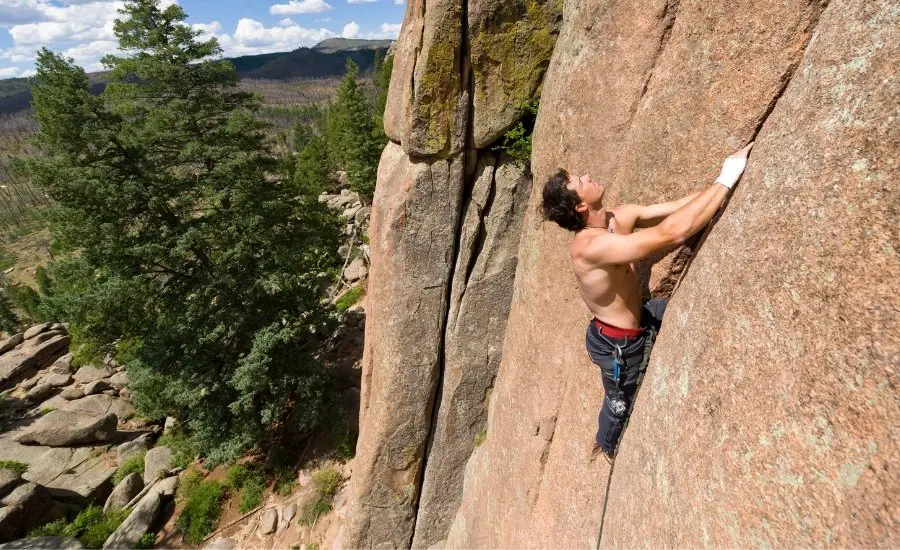
The attributes desired for crack climbing shoes are much different than that of highly technical bouldering.
Crack climbing requires climbers to shove their feet into the wall and stand up on them. Aggressive climbing shoes will prevent climbers from getting their feet deep enough into the wall. In addition to this, aggressive shoes can make crack climbing incredibly painful.
If you are interested in doing more crack climbing, I highly recommend against aggressive shoes. I composed an entire article which details the best gear for crack climbing (including shoes). I recommend checking out that article linked here.
High Volume Face Climbers
The benefits of aggressive climbing shoes are not fully realized and are not worth it for climbers who will be climbing all-day long on vertical faces.
Wearing aggressive climbing shoes for multi-pitch trad or long sport climbing days will put incredible stress and strain on the climber’s feet. In this case, opting for a shoe with moderate or even neutral downturn will provide the climber with the comfort they need.
On top of this, there are not a lot of climbers out there with the endurance to climb highly technical overhanging routes all day long.
